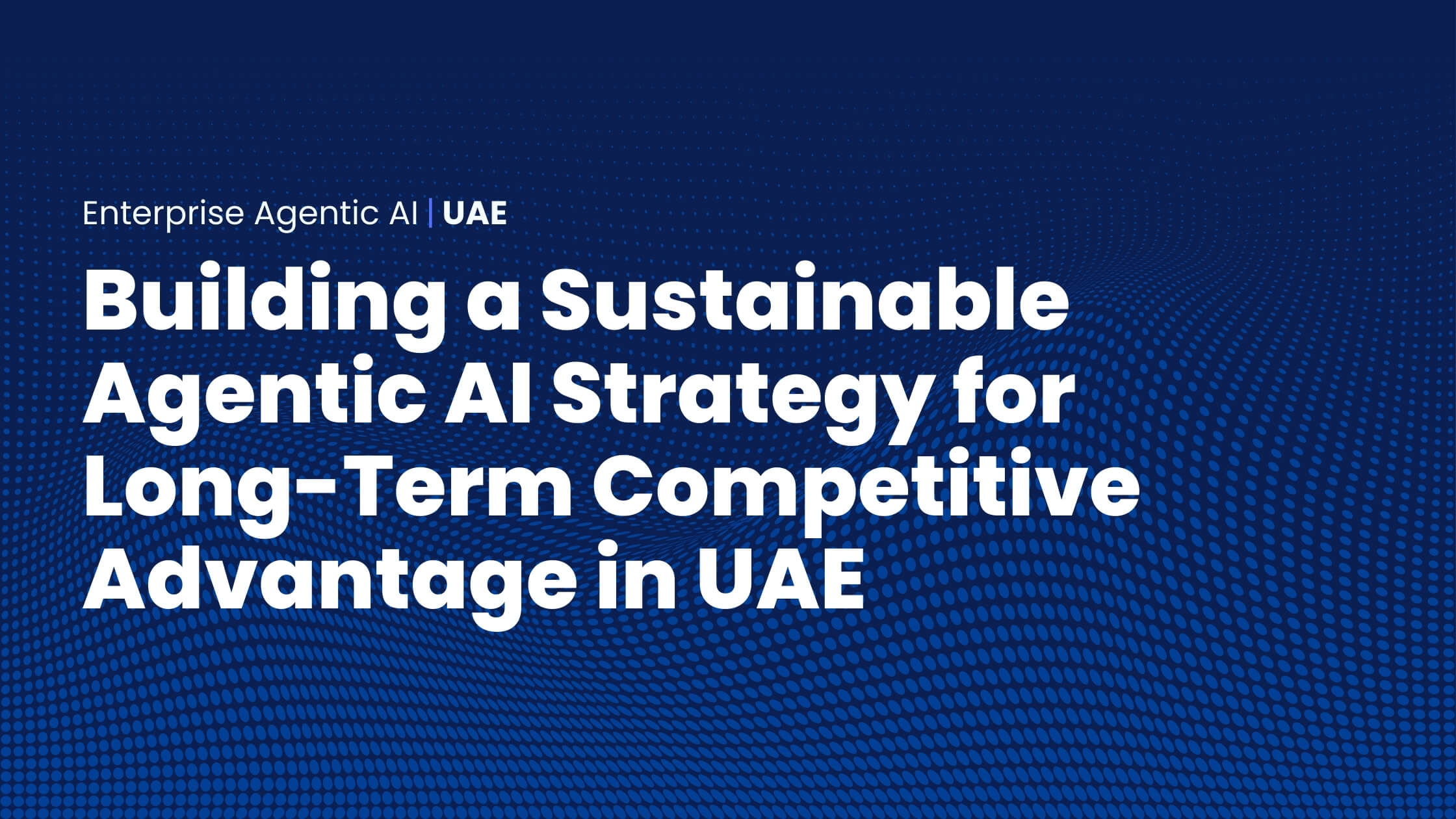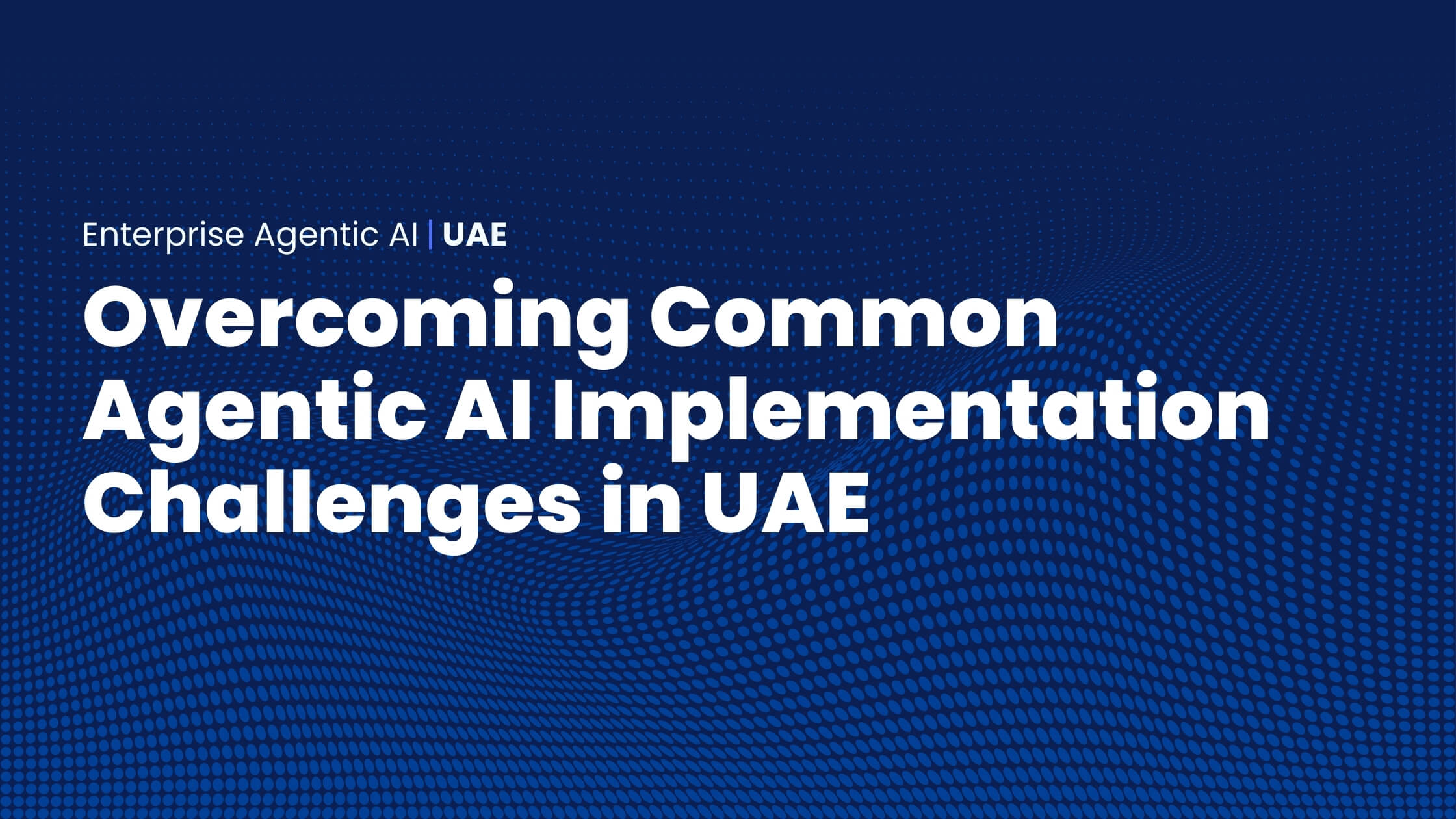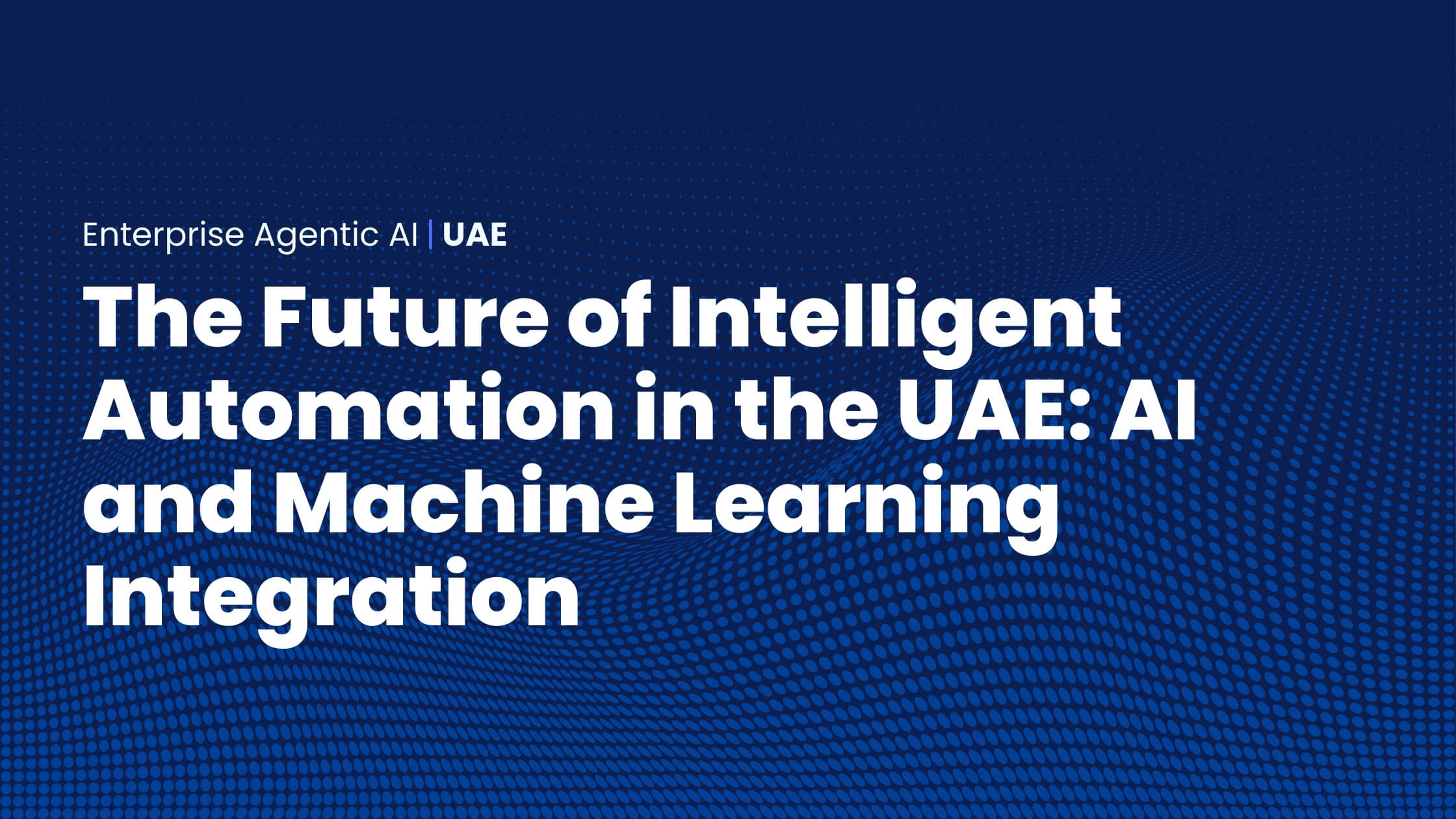December 24, 2025
Building a Sustainable Agentic AI Strategy for Long-Term Competitive Advantage in the UAEA major UAE bank recently paused its generative AI customer service pilot after three months of development. The reason? Lack of governance framework to ensure regulatory compliance and prevent hallucination risks. Meanwhile, their competitor - with robust AI governance already in place - launched a similar solution in half the time, capturing market share and customer mindshare.
This scenario is playing out across the UAE's business landscape. As organisations race to harness generative AI's transformative potential, many are discovering that governance isn't the brake on innovation they feared - it's the accelerator they need.
For C-suite executives navigating the UAE's ambitious AI revolution, the strategic question has evolved: Not whether to govern AI, but how to leverage governance as your organisation's competitive weapon.
The UAE hasn't just embraced AI - it's architecting the future of responsible AI deployment. With Abu Dhabi targeting to become the world's first fully AI-powered government by 2027, backed by investments exceeding $13 billion over three years, the message to enterprises is clear: AI leadership requires governance excellence.
The 2024 UAE AI Charter establishes 12 guiding principles prioritising inclusivity, transparency, innovation, and accountability. Yet many organisations miss the strategic insight embedded in this framework: these aren't merely compliance guidelines - they're competitive differentiators waiting to be claimed.
The First-Mover Dividend
KPMG Lower Gulf's analysis is unambiguous: "organisations that act now to align with these principles will gain a competitive edge, enabling them to unlock opportunities for responsible innovation, positioning themselves as leaders in ethical AI adoption."
This advantage manifests across multiple dimensions:
Market Leadership: While competitors await regulatory mandates, early adopters establish governance frameworks that become industry benchmarks, positioning them as trusted advisors in their sectors.
Regulatory Agility: As AI regulations formalise - a certainty given global trends from the EU AI Act to evolving frameworks across the GCC - organisations with mature governance face minimal disruption while others halt AI initiatives mid-deployment.
Investment Magnetism: With UAE investment vehicles like MGX (targeting $100 billion) and the Stargate Project ($500 billion) reshaping global AI infrastructure, entities demonstrating governance maturity become preferred partners for capital deployment.
The prevailing mental model frames AI governance as necessary overhead - compliance theater that adds cost and complexity while slowing innovation. This perspective isn't just outdated; in the UAE's hyper-competitive AI landscape, it's strategically dangerous.
Elite organisations across banking, healthcare, government, and telecommunications are discovering that robust governance doesn't constrain innovation - it turboch charges it. The evidence is compelling:
Speed Paradox: Governance Accelerates Deployment
Infosys leveraged IBM watsonx.governance to achieve a 150% increase in operational efficiency across 2,700 AI use cases spanning functions and geographies. The mechanism? When teams operate within clear governance guardrails - knowing their models are monitored for bias, drift, and performance - they move faster, iterate more boldly, and deploy with confidence.
IBM's internal implementation delivered a 58% reduction in data clearance request processing time. The bottleneck wasn't governance itself - it was the absence of systematic governance creating friction at every decision point.
Innovation Multiplication: Safe Experimentation at Scale
Well-architected governance creates what leading organisations call "innovation sandboxes" - controlled environments where teams can experiment aggressively knowing that automated guardrails prevent catastrophic failures.
The US Open used watsonx.governance to remove bias from tournament data, increasing court fairness from 71% to 82%. This wasn't compliance - it was competitive advantage, demonstrating fairness that enhanced brand reputation and stakeholder trust.
Resource Liberation: Automation Frees Talent for Value Creation
Manual AI oversight doesn't scale. Financial institutions implementing AI governance platforms report dramatic efficiency gains: HSBC detected 2-4x more confirmed suspicious activity while reducing false positives by 60%, allowing risk managers to focus on high-value investigations rather than administrative overhead.
For UAE enterprises deploying large language models and generative AI, governance transcends best practice - it becomes existential. The unique risk profile of Gen AI - hallucinations producing confident but incorrect outputs, bias amplification, training data provenance concerns, regulatory ambiguity - makes governance the prerequisite for scaling these transformative technologies.
Financial Services: Scaling Value While Managing Risk
McKinsey estimates banks implementing generative AI can realise $200-$340 billion in potential annual value globally. Yet regulatory fines in banking have exceeded $400 billion since 2008. This tension - transformative upside paired with catastrophic downside - makes governance non-negotiable.
Progressive UAE financial institutions are deploying comprehensive frameworks enabling them to:
Automate Compliance Workflows: Gen AI tools can automate Suspicious Activity Reports and other regulatory submissions, dramatically reducing manual effort while improving consistency and accuracy.
Transform Fraud Detection: AI-powered systems boost fraud detection rates by 20-85% while reducing false positives by similar magnitudes, allowing security teams to focus on genuine threats.
Scale Customer Experience: LLM-powered assistants handle routine inquiries with 24/7 availability while human agents focus on complex, high-value interactions. With proper governance, these systems maintain regulatory compliance while delivering superior service.
Accelerate Document Intelligence: Gen AI extracts key information from loan applications, KYC forms, and financial statements, converting unstructured data into actionable insights while governance frameworks ensure accuracy and auditability.
The Governance-Innovation Flywheel
organisations implementing robust Gen AI governance unlock a self-reinforcing cycle:
1. Regulatory Readiness as Market Differentiator
The global AI regulatory landscape is crystallising rapidly. The EU AI Act establishes precedents influencing regulations worldwide. Qatar has implemented legally binding AI guidelines for financial firms. The UAE's formalised regulations are inevitable.
organisations building governance now transform compliance from reactive crisis to proactive advantage. When regulations codify, mature organisations face minimal disruption - potentially even accelerating deployment as competitors halt initiatives to achieve compliance.
2. Trust as Tangible Competitive Asset
In regulated sectors where brand reputation drives customer acquisition and retention, trust translates directly to market share. organisations transparently demonstrating responsible AI practices differentiate themselves in crowded markets.
The data reveals opportunity: 42% of enterprise-scale companies have integrated AI, yet only 11% of executives report fully implementing responsible AI capabilities like data governance, model testing, and third-party risk management. This gap represents white space for organisations willing to lead.
3. Talent Magnetism in a Competitive Market
Top AI talent - data scientists, ML engineers, prompt engineers, AI ethicists - increasingly prioritise employers committed to responsible AI. Robust governance signals organisational seriousness, long-term thinking, and professional infrastructure enabling meaningful work.
As UAE entities compete globally for scarce AI expertise, governance maturity becomes a recruiting differentiator.
4. Premium Partnership Access
As the UAE's AI ecosystem matures, governance capabilities become prerequisites for premium opportunities. Government procurements, enterprise partnerships, and international collaborations increasingly mandate demonstrated governance frameworks.
organisations lacking governance maturity find themselves excluded from high-value opportunities, regardless of technical capabilities.
5. Risk-Adjusted Innovation Velocity
Strong governance doesn't slow innovation - it enables faster, bolder innovation by quantifying and managing downside risks. When organisations confidently deploy AI knowing they have real-time monitoring, explainability tools, and intervention capabilities, they pursue more ambitious applications.
This confidence compounds: each successful deployment builds organisational capability and stakeholder trust, enabling progressively more strategic AI initiatives.
6. Operational Excellence Through Unified Oversight
Comprehensive governance platforms provide unified visibility across entire AI portfolios - models, applications, and autonomous agents deployed across cloud and on-premises environments.
This visibility enables:
organisations need not achieve governance perfection immediately. The strategic advantage accrues to those who start thoughtfully and iterate intelligently.
Phase 1: Foundation (4-6 Weeks)
Establish governance structures and baselines:
Phase 2: Quick Wins (8-12 Weeks)
Demonstrate value through targeted implementations:
Phase 3: Enterprise Scale (3-6 Months)
Expand governance across the AI portfolio:
Phase 4: Strategic Excellence (Ongoing)
Leverage governance as competitive differentiator:
Platform selection profoundly impacts governance success. IBM's watsonx.governance delivers end-to-end capabilities purpose-built for enterprise complexity:
Universal Compatibility: Govern models deployed anywhere - IBM watsonx.ai, OpenAI, Amazon Bedrock, Microsoft Azure, custom-built systems - through unified platform eliminating governance silos.
Automated Regulatory Compliance: Translate complex, evolving regulations (EU AI Act, NIST AI RMF, ISO 42001) into enforceable technical policies automatically applied across systems, reducing compliance burden while improving consistency.
Comprehensive Risk Management: Monitor in real-time for fairness, bias, drift, and LLM-specific risks like hallucination, toxicity, and inappropriate content generation. Preset thresholds trigger automated alerts enabling rapid intervention.
Audit Trail Excellence: Automatically document complete model lifecycle - training data provenance, development decisions, stakeholder approvals, performance history - creating defensible audit trail satisfying regulatory requirements.
Flexible Deployment: Operate across hybrid cloud and on-premises environments, supporting data sovereignty requirements while maintaining unified governance visibility.
Proven at Scale: organisations globally trust watsonx.governance: Banco do Brasil for unified AI oversight, IBM for approving 1,000+ models for reuse, Infosys for governing 2,700+ AI use cases across geographies.
The UAE's AI trajectory creates a defining moment for regional enterprises. As government entities pioneer AI-powered services and position the nation as a global AI hub, private sector organisations face a binary choice: lead through governance excellence or follow reactively as regulations and competitive pressures mount.
The evidence compels action:
organisations implementing strategic AI governance don't merely mitigate risks - they accelerate innovation, establish competitive differentiation, attract premium talent and partnerships, access high-value opportunities unavailable to less-prepared competitors, and position themselves for sustained success in an AI-defined economy.
The window for first-mover advantage is narrowing. As more organisations recognise governance as strategic asset rather than compliance burden, the competitive differentiation it provides diminishes.
For UAE business leaders, the question isn't whether AI governance delivers competitive advantage - it's whether your organisation will claim that advantage before competitors do.
The cost of waiting exceeds the cost of acting. The organisations that move decisively today will define their industries tomorrow.
Our team specialises in helping UAE enterprises across financial services, healthcare, government, telecommunications, and other regulated sectors implement strategic AI governance frameworks aligned with the UAE Charter and global best practices.
Leveraging IBM watsonx.governance, we deliver comprehensive solutions that:
Discover how governance can become your competitive differentiator. Our consultation includes:
Ready to lead rather than follow?
[Schedule your strategic consultation today →]

Stay Informed: Engage with our Blog for Expert Analysis, Industry Updates, and Insider Perspectives



let’s design the governance framework your AI strategy deserves
.webp)
.webp) Let's Talk
Let's Talk